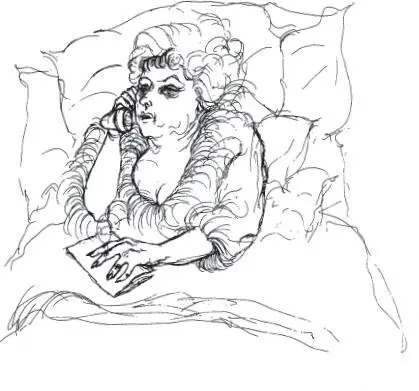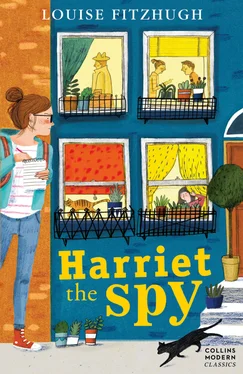“Aw, gee, Janie’s working in the lab. You both are always working.”
“Why don’t you practise? How’re you ever going to be a ball player?”
“Can’t. Have to clean the house. Come over if you get time.”
Harriet said, “OK,” then “goodbye,” and ran towards the house. It was time for her cake and milk. Every day at three-forty she had cake and milk. Harriet loved doing everything every day in the same way.
“Time for my cake, for my cake and milk, time for my milk and cake.” She ran yelling through the front door of her house. She ran through the front hall past the dining room and the living room and down the steps into the kitchen. There she ran smack into the cook.
“Like a missile you are, shot from that school,” screamed the cook.
“Hello cook, hello, cooky, hello, hello, hello, hello,” sang Harriet. Then she opened her notebook and wrote:
BLAH, BLAH, BLAH. I ALWAYS DO CARRY ON A LOT. ONCE OLE GOLLY SAID TO ME, “I COULD NEVER LOSE YOU IN A CROWD, I’D JUST FOLLOW THE SOUND OF YOUR VOICE.”
She slammed the notebook and the cook jumped. Harriet laughed.
The cook put the cake and milk in front of her. “What you always writing in that dad-blamed book for?” she asked with a sour little face.
“Because,” Harriet said around a bite of cake, “I’m a spy.”
“Spy, huh. Some spy.”
“I am a spy. I’m a good spy, too. I’ve never been caught.”
Cook settled herself with a cup of coffee. “How long you been a spy?”
“Since I could write. Ole Golly told me if I was going to be a writer I better write down everything, so I’m a spy that writes down everything.”
“Hmmmmmmph.” Harriet knew the cook couldn’t think of anything to say when she did that.
“I know all about you.”
“Like fun, you do.” The cook looked startled.
“I do too. I know you live with your sister in Brooklyn and that she might get married and you wish you had a car and you have a son that’s no good and drinks.”
“What do you do, child? Listen at doors?”
“Yes,” said Harriet.
“Well, I never,” said the cook. “I think that’s bad manners.”
“Ole Golly doesn’t. Ole Golly says find out everything you can ’cause life is hard enough even if you know a lot.”
“I bet she don’t know you spooking round this house listening at doors.”
“Well, how am I supposed to find out anything?”
“I don’t know,” – the cook shook her head – “I don’t know about that Ole Golly.”
‘What do you mean?” Harriet felt apprehensive.
“I don’t know. I just don’t know. I wonder about her.”
Ole Golly came into the room. “What is it you don’t know?”
Cook looked as though she might hide under the table. She stood up. “Can I get you your tea, Miss Golly?” she asked meekly.
“That would be most kind of you,” said Ole Golly and sat down.
Harriet opened her notebook:
I WONDER WHAT THAT WAS ALL ABOUT. MAYBE OLE GOLLY KNOWS SOMETHING ABOUT COOK THAT COOK DOESN’T WANT HER TO KNOW. CHECK ON THIS.
“What do you have in school this year, Harriet?” asked Ole Golly.
“English, History, Geography, French, Math, ugh, Science, ugh, and the Performing Arts, ugh, ugh, ugh.” Harriet rattled these off in a very bored way.
“What history?”
“Greeks and Romans, ugh, ugh, ugh.”
“They’re fascinating.”
“What?”
“They are. Just wait, you’ll see. Talk about spies. Those gods spied on everybody all the time.”
“Yeah?”
“‘Yes,’ Harriet, not ‘yeah’.”
“Well, I wish I’d never heard of them.”
“Ah, there’s a thought from Aesop for you: ‘We would often be sorry if our wishes were gratified.’” Ole Golly gave a little moo of satisfaction after she had delivered herself of this.
“I think I’ll go now,” Harriet said.
“Yes,” said the cook, “go out and play.”
Harriet stood up. “I do not go out to PLAY, I go out to WORK!” and in as dignified a way as possible she walked from the room and up the steps from the kitchen. Then she began to run, and running furiously, she went past the first floor with the living room and dining room, the second floor with her parents’ bedroom and the library, and on up to the third floor to her little room and bath.
Harriet loved her room. It was small and cosy, and the bathroom was a little one with a tiny window which looked out over the park across the street. Her room had a bigger window. She looked around, pleased as always by the order, the efficiency of it. She always picked up everything immediately, not because anyone nagged at her – no one ever had – but because it was her room and she liked to have it just so. Harriet was just so about a lot of things. Her room stood around her pleasantly, waiting for her. Her own small bed next to the window, her bookcase filled with her books, her toy box, which had been filled with toys but which now held her notebooks because it could be locked, her desk and chair at which she did her homework – all seemed to look back at her with affection. Harriet put her books down on the desk and hurriedly began to change into her spy clothes.
Her spy clothes consisted first of all of an ancient pair of blue jeans, so old that her mother had forbidden her to wear them, but which Harriet loved because she had fixed up the belt with hooks to carry her spy tools. Her tools were a flashlight, in case she were ever out at night, which she never was, a leather pouch for her notebook, another leather case for extra pens, a water canteen, and a boy scout knife which had, among other features, a screwdriver and a knife and fork which collapsed. She had never had occasion to eat anywhere, but someday it might come in handy.
She attached everything to the belt, and it all worked fine except that she rattled a little. Next she put on an old dark-blue sweatshirt with a hood which she wore at the beach house in the summer so that it still smelled of salt air in a comforting way. Then she put on an old pair of blue sneakers with holes over each of her little toes. Her mother had actually gone so far as to throw these out, but Harriet had rescued them from the garbage when the cook wasn’t looking.
She finished by donning a pair of black-rimmed spectacles with no glass in them. She had found these once in her father’s desk and now sometimes wore them even to school, because she thought they made her look smarter.
She stood back and looked at herself in the full-length mirror which hung on her bathroom door. She was very pleased. Then she ran quickly down the steps and out, banging the front door behind her.

Chapter Three
SHE WAS PARTICULARLY excited as she ran along, because today she was adding a new spying place to her route. She had discovered a way into a private house around the corner. Private houses were much more difficult to get into than apartment buildings, and this was the first one Harriet had managed. It belonged to a Mrs Agatha K. Plumber who was a very strange, rather theatrical lady who had once married a man of considerable means. She was now divorced, lived alone, and apparently talked on the telephone all day. Harriet had found this much out from first listening to several conversations between Mrs Plumber’s maid and an overly friendly garbage man. Harriet had pretended to play ball while the garbage was being picked up.
Just yesterday she had discovered that by timing it exactly she had just enough time to jump in the dumbwaiter and slide the door closed before the maid completed one of her frequent trips up and down the stairs. The dumbwaiter was no longer used but fortunately had not been boarded up. Since there was a small crack in the door, Harriet could see and hear perfectly.
Читать дальше













